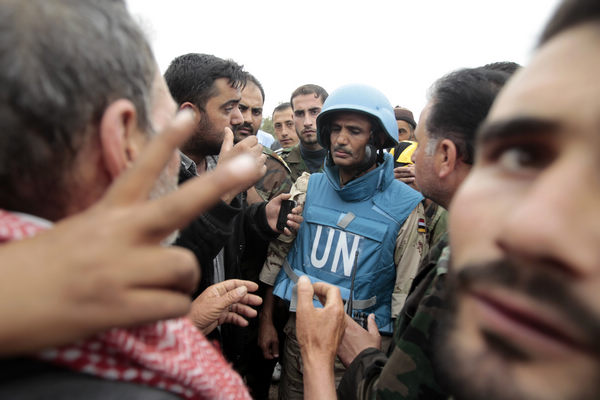Syria's third largest city, Homs, used to attract large numbers of tourists, keen to see its mixed Christian and Islamic heritage and peaceful co-existence. Now, an exodus by the local population has replaced commercial activities, tourism and anything approaching a normal life.
A police patrol joined our motorcade as we entered the city, and when we requested to go to the Baba Amr district, the scene of fiercest fighting during the preceding months, another group of heavily armed security guards was ordered to go with us. Although we didn't hear any gunshots or explosions, the situation appeared much more sensitive and dangerous than we had expected.
 |
|
Anti-regime protestors talk to a UN observer in the village of Azzara in Homs on May 4. Syria's parliamentary polls on May 7, against a backdrop of unrest. |
The scene that met our eyes once we had passed through the checkpoint into Baba Amr was one of utter devastation. The streets and alleyways were empty and desolate, and standing in the noiseless street, I was overwhelmed by the 30 C heat and the sights in front of me.
What I saw emphasized not only how fierce the battles have been, but also how daunting life must be for the people of the area. Not one of the houses or commercial buildings was untouched, every window of every room was shattered, the vaults of mosques displayed huge shell holes, and auto wrecks and garbage carpeted the roads. This is already a ghost city.
"Look." One of our guards pointed at a ruined house, its walls pockmarked by countless bullets holes. "This place was used for food distribution and now it's just rubble," he said.
However, people are still living among the debris, but their appearances on the streets are few and far between. The cease-fire agreement did prevent the escalation of violence but small-scale skirmishes still pose a threat to civilians, especially as the night raids against forces loyal to the Syrian government have increased, according to the governor of Homs, Ghassan Abdelaal.
He said a lack of leadership among the opposition groups and what he described as the "dual identity" of their fighters prevented them from gaining total control of this area. "They are civilians in the daytime and become militants when they take up arms at night," he said. "We don't want to kill any civilians, and we are still under pressure from Western countries."
